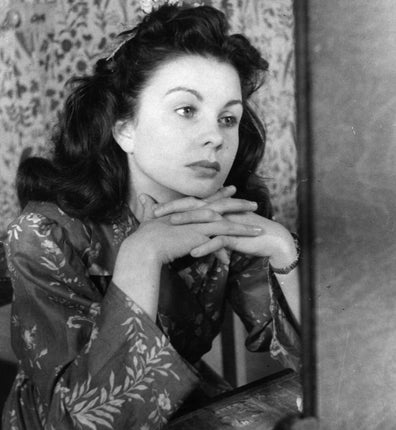Your support helps us to tell the story
From reproductive rights to climate change to Big Tech, The Independent is on the ground when the story is developing. Whether it's investigating the financials of Elon Musk's pro-Trump PAC or producing our latest documentary, 'The A Word', which shines a light on the American women fighting for reproductive rights, we know how important it is to parse out the facts from the messaging.
At such a critical moment in US history, we need reporters on the ground. Your donation allows us to keep sending journalists to speak to both sides of the story.
The Independent is trusted by Americans across the entire political spectrum. And unlike many other quality news outlets, we choose not to lock Americans out of our reporting and analysis with paywalls. We believe quality journalism should be available to everyone, paid for by those who can afford it.
Your support makes all the difference.Jean Simmons, the stunning beauty who sang with Marlon Brando in Guys and Dolls and was Ophelia to Laurence Olivier's Hamlet, died today.
Her agent, Judy Page, told the Los Angeles Times that Simmons, who had lung cancer, died on Friday night US time at her home in Santa Monica, California.
Simmons, born in Crouch Hill, London, made her movie debut at 14 in the 1944 film Give Us The Moon. She would go on to star opposite Kirk Douglas in Spartacus and Burt Lancaster in Elmer Gantry.
But she was best recognised for playing opposite Marlon Brando in Guys And Dolls.
Simmons won an Emmy for the 1983 TV mini-series The Thorn Birds and appeared on TV and on stage until the 1990s.
After Give Us The Moon, several minor films followed before British director David Lean gave Simmons her breakthrough role of Estella, companion to the reclusive Miss Havisham in 1946's Great Expectations.
That was followed by the exotic Black Narcissus and then Olivier's Oscar-winning Hamlet in 1948, for which Simmons was nominated as best supporting actress.
She would be nominated for another Oscar, for best actress for 1969's The Happy Ending, before moving largely to television roles in the 1970s, 80s and 90s.
Her other notable films included Until They Sail (with Paul Newman), The Big Country (Gregory Peck), This Earth Is Mine (Rock Hudson), All the Way Home (Robert Preston), Mister Buddwing (James Garner) and Rough Night in Jericho (Dean Martin).
Simmons left Britain for Hollywood in 1950, accompanied by her future husband Stewart Granger. There, they were befriended by reclusive tycoon Howard Hughes, who flew them to Tucson, Arizona, for a surprise wedding.

Watch Apple TV+ free for 7 days
New subscribers only. £8.99/mo. after free trial. Plan auto-renews until cancelled

Watch Apple TV+ free for 7 days
New subscribers only. £8.99/mo. after free trial. Plan auto-renews until cancelled
"When I returned from the honeymoon," Simmons told a reporter in 1964, "I learned that Hughes owned me - he had bought me from (British producer) J Arthur Rank like a piece of meat."
What followed was a string of films that she would later dismiss as terrible, although she took some solace in the fact that Hughes, legendary in those days as a womaniser, never bothered her.
"I was married to Jimmy (Granger's real name was James Stewart), so Hughes remained at a distance," she recalled. "But those movies! So terrible they aren't even on videocassettes."
Among the titles she referred to are Angel Face, Affair With a Stranger and She Couldn't Say No.
Simmons finally ended up suing Hughes for the right to make more prestigious films at other studios, and the result was Young Bess,as young Queen Elizabeth I, The Robe - the first movie filmed in CinemaScope - The Actress, The Egyptian and Desiree.
In the latter film, in 1954, she played the title role opposite Brando's Napoleon.
The pair teamed again in 1955 for Guys And Dolls, the Samuel Goldwyn-produced musical in which Simmons is Sarah Brown, a Salvation Army-style reformer conned into a weekend fling in Havana by gambler Sky Masterson.
She loved the rehearsals for that film, Simmons recalled in 1988, "especially the dancing routines with Marlon trying not to step on me and choreographer Michael Kidd looking very worried".
"I got to sing," she added, "because Sam Goldwyn said, 'You might as well wreck it with your own voice than somebody else's'."
By the 1970s, her career as a lead film actress had ended, but Simmons continued to work regularly on stage and in television.
In the 1980s and 90s she appeared on television shows such as Murder, She Wrote, In the Heat Of The Night and Xena: Warrior Princess. She also appeared in numerous TV movies and mini-series, including a 1991 version of Great Expectations, in which she played Miss Havisham this time.
The careers of both Simmons and her husband Granger had flourished in the 1950s, he as a swashbuckler, she as the demure heroine. But long absences on film locations strained their relationship and they divorced in 1960. They had a daughter, Tracy.
Shortly after her divorce, Simmons married Richard Brooks, who had directed her in Elmer Gantry and would again in The Happy Ending. Their marriage, which produced a daughter, Kate, ended in divorce in 1977.

Join our commenting forum
Join thought-provoking conversations, follow other Independent readers and see their replies
Comments